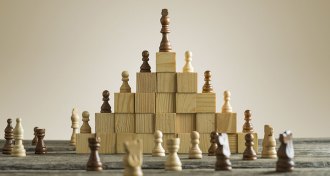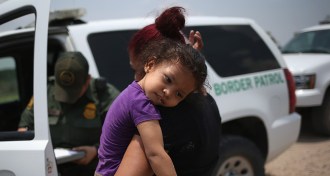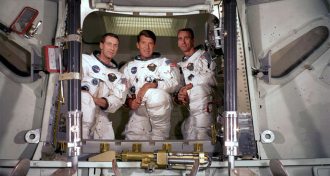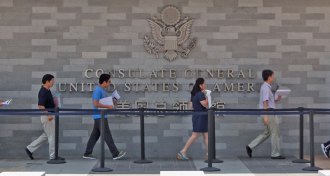Science & Society
Sign up for our newsletter
We summarize the week's scientific breakthroughs every Thursday.
-
 Genetics
GeneticsThe study of human heredity got its start in insane asylums
‘Genetics in the Madhouse’ reveals how human heredity research began as a statistical science in 19th century insane asylums.
By Bruce Bower -
 Health & Medicine
Health & MedicineMedical breakthroughs come with a human cost
Editor in Chief Nancy Shute muses on the risks many medical advances pose in their infancy.
By Nancy Shute -
 Health & Medicine
Health & Medicine‘Aroused’ recounts the fascinating history of hormones
The new book "Aroused" demystifies hormones, the chemicals that put the zing into life.
-
 Science & Society
Science & SocietyFighting sexual harassment in science may mean changing science itself
Sexual harassment is disturbingly prevalent in academia. But a course correction may involve tearing down the hierarchy that makes science run.
-
 Neuroscience
NeuroscienceSplitting families may end, but migrant kids’ trauma needs to be studied
The long-term effects of separating children from their parents at the U.S. border need to be studied, scientists say.
-
 Genetics
GeneticsDNA testing can bring families together, but gives mixed answers on ethnicity
DNA testing has become a new way for millions of Americans to expand their family trees and learn something about themselves, but results vary widely.
-
 Science & Society
Science & SocietySo what do you know about Emmy Noether?
Editor in Chief Nancy Shute discusses physicist Emmy Noether and women being underrepresented in science fields.
By Nancy Shute -
 Genetics
GeneticsWhy using genetic genealogy to solve crimes could pose problems
Rules governing how police can use DNA searches in genealogy databases aren’t clear, raising civil rights and privacy concerns.
-
 Tech
Tech50 years ago, NASA astronauts prepared to return to space
Apollo 7 crewmembers underwent their first major tests 50 years ago. Today, U.S. astronauts struggle to get into space.
By Dan Garisto -
 Genetics
GeneticsPrivacy and consumer genetic testing don’t always mix
Interested in taking a direct-to-consumer genetic test? Here are some things you should know.
-
 Neuroscience
NeuroscienceHere’s why scientists are questioning whether ‘sonic attacks’ are real
Sonic attacks would be hard to pull off and a terrible way of incapacitating diplomats, experts say.
-
 Science & Society
Science & SocietyThe power of great editors, their lessons and legacy
Editor in Chief Nancy Shute reflects on the history and legacy of Science News editors.
By Nancy Shute